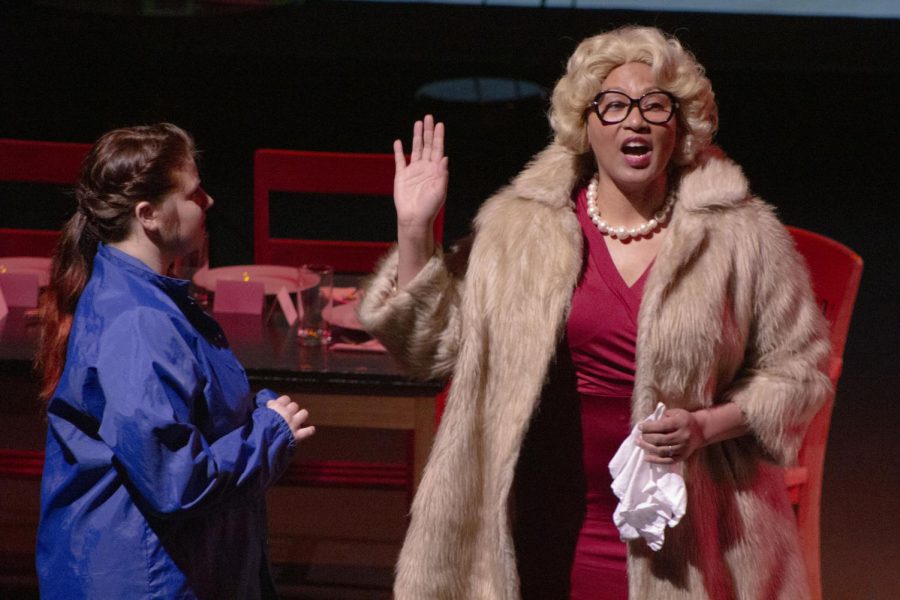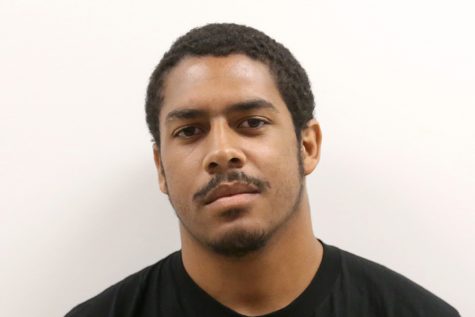Getting lost in a digital world
Mrs. Gottlieb, played by Nicole Matthews, first meets Jean, played by Miranda Lenore, in “Dead Man’s Cell Phone” in the Knox Center.
Mar 20, 2019
An all too common narrative in media is the way technology makes our society more connected than at any point in history while simultaneously making us emotionally detached from one another.
As with any common message, the key is presenting it in an original, thought-provoking manner and the Contra Costa College drama department’s production of “Dead Man’s Cell Phone” accomplishes that despite some issues.
“Dead Man’s Cell Phone,” written by Sarah Ruhl and directed by Diablo Valley College professor Ryan Weible manages to portray a multifaceted story that provides a thought-provoking commentary on love, mortality and humanity’s connection with technology.
The dated script is a little too on the nose with its commentary, but it’s forgivable knowing the play was written prior to the release of the first iPhone.
This was one of the first shows to comment on the way one’s relationship with technology will affect interpersonal relationships.
The stage set the tone for a performance that felt surreal with quick transitions from one scene to the next all with each area of the stage representing different areas — like snapshots in a dream.
Each of the dinner scenes in particular were delightfully odd with clever lines delivered by Jean, played by Miranda Lenore, who acted as the straight man to the rest of the dinner party antics.
There is an absurdity within the dark humor that runs throughout the performance that sets up some of the best laughs in the play.
From the opening scene, Jean finds herself wrapped up in the mysterious life of Gordon, played by Gregory Lee. Irritated by Gordon’s phone ringing, which seems to go on forever, she approaches him to discover that he’s sitting in the cafe dead.
Still annoyed by the ringing, she picks up his phone and the story takes off from there. She learns about everything from Gordon’s family and occupation to him finding love.
However, Jean’s obsession with following Gordon’s life through his cellphone leaves her neglecting her own real-world experiences.
One particular standout moment is Jean’s discussion with Hermia, played by Miranda Tilley, in a bar about Gordon’s affair and occupation as an organ seller. The two actors have great chemistry going back and forth with yet again Jean playing it straight for Hermia’s drunk musings.
The play delivers in the emotional scenes as well.
While some scenes feel rushed and the short run time leaves more to be desired, two key scenes are given the proper time to develop and deliver a real impact.
Gordon begins Act 2 alone on stage explaining the events leading up to his sudden death in the coffee shop and contemplating his life. Lee spends what feels like 10 minutes on stage alone and delivers a great soliloquy, which develops into the best moment of the show.
The final scene, where Gordon and Jean meet in the coffee shop which represents some kind of purgatory space, is a great climactic moment.
Jean meets Gordon and realizes he’s just a flawed man who doesn’t deserve much of the reverence she seems to have for him during the play.
After some harsh self-assessment and reconnecting with his strained relationships, Gordon escapes the purgatory.
Ironically, Jean must follow in Gordon’s footsteps again and learn to get away from the binds of technology to regain her connection with the real world.



